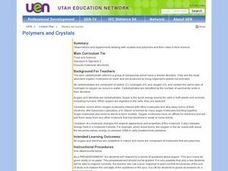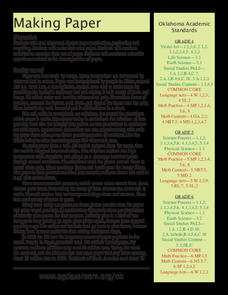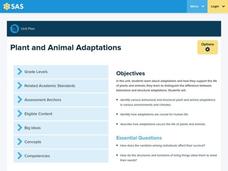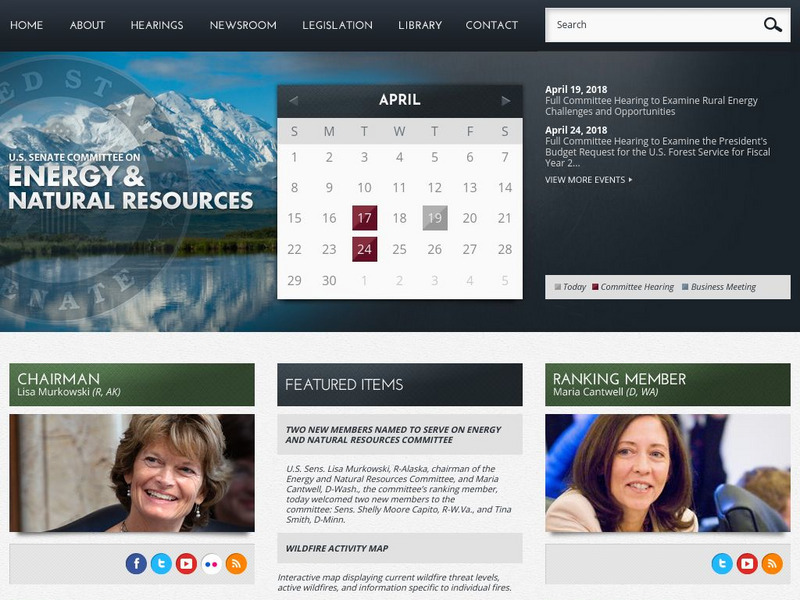Curated OER
Polymers and Crystals
Learners experiment with crystals and polymers and examine their roles in food science.
Curated OER
Multiplying Microbes
Students examine environmental conditions that effect bacteria growth. They culture bacteria, design and conduct an experiment, and identify the conditions that effected the bacteria growth using the scientific method.
Curated OER
Making Paper
Fourth graders investigate the paper usage in their classroom and in other countries by using estimation, counting, and measurement skills. They make paper from recycled paper.
Curated OER
Groundwater: Cleaning Up
Students research the various aspects of groundwater contamination that threaten health and human safety. They create a model and display that informs other about the health and safety risks. Students illustrate ways in which these...
Curated OER
Making Paper
Pupils make paper from recycled paper. The student estimates, counts, and measures he amount of paper consumed in a classroom daily. They discover that if we use too much paper, it fills up landfills. Some activities they are doing...
Curated OER
On the Road Again": Moving People, Products, and Ideas
In this lesson plan learners learn how to identify modes of transportation and communication for moving people, products, and ideas from place to place. Students also study the advantages and disadvantages of different modes of...
Curated OER
Settling Nroth America: Improvisation and Playwriting
Students map the classroom by marking the movement of the first Americans' migration from Alaska down into North America. To improve their skills in map-reading and sense of direction, students identify physical features of the map and...
Curated OER
Caterpillar Habit
Students watch a caterpillar change and become a butterfly. In this lesson about the life cycle of a caterpillar and a butterfly, students prepare and maintain the habitat of the caterpillar. Students observe the stages of the...
Curated OER
Food Webs
Fourth graders discover how organisms depend upon each other in an ecosystem. In this ecosystems lesson plan, 4th graders use food webs to discuss the interdependence between organisms in an ecosystem.
Curated OER
Oil Trap Model
Students investigate oil accumulation by creating a model in their classroom. In this petroleum geology lesson, students discuss where oil comes from and why it is vital to our society at this particular time. Students cut out a 3-D...
Pennsylvania Department of Education
Plant and Animal Adaptations
Fourth graders identify behavioral and structural adaptations to plant and animal life. In this unit overview, 4th graders discuss the importance of variation and adaptation in a species survival. This is a unit overview and does not...
BioEd Online
Bio Ed Online: Can Nutrients in Water Cause Harm?
Many different kinds of organisms live in water. Excess nutrients can cause over-abundant growth of some organisms living in water and non-point source pollution is a major threat to water supplies in the United States. In this lesson...
American Museum of Natural History
American Museum of Natural History: What Is Water?
This comprehensive article provides information about the physical properties of water, the importance of water as an Earth material, the processes and cycles that water undergoes on Earth, its importance to life on Earth, and why we...
Other
Nc Department of Energy and Natural Resources: What Is Stormwater Pollution
When it rains, some of the rainwater soaks into the ground, and part of it flows over the ground and directly into creeks, streams, or rivers. This water that runs off into the river is called runoff, or sometimes stormwater runoff....
TeachEngineering
Teach Engineering: Can You Catch the Water?
Students construct a three-dimensional model of a water catchment basin using everyday objects to create hills, mountains, valleys and water sources. They experiment to see where rain travels and collects, and survey water pathways to...
PBS
Pbs Learning Media: Primary Source: Environmental Preservation Progressive Era
This collection uses primary sources to environmental preservation in the Progressive Era.
Globe
The Globe Program: Learning to Benefit the Environment
The GLOBE program is a worldwide network of students and scientists working together to monitor Earth's atmosphere and water. There are lots of resources here, and you can email a student involved in the program to learn more about GLOBE.
Nature Conservancy
The Nature Conservancy: From America's Rainforest to America's Desert
On this virtual field trip, teachers will help their students travel to the lush, rain-soaked splendor of the Olympic Peninsula and explore the urban watershed of Seattle. Next, they will head to Arizona's dry, desert landscape and take...
US Senate
U.s. Senate Committee on Energy and Natural Resources
The responsibilities of the Committee on Energy and Natural Resources oversees important legislation in Congress and has distinguished itself as among the most nonpartisan in the Senate.
PBS
Pbs News Hour Extra: Tracking the Health Effects of Natural Disasters
Students examine the impact of natural disasters, such as flooding, on public health, and study diseases and other secondary conditions associated with stagnant water. Lesson includes resources for students to research epidemics and...
Other
North Carolina Department of Energy and Natural Resources: Pollution Solutions
Try to find at least eight things in the picture that could cause litter, waste, or other pollutants to end up in the storm drain and eventually flow into nearby lakes and streams. Includes a link to an interactive page of this activity....
US Geological Survey
U.s. Geological Survey: The Usgs and Science Education
"Explore things on, in, around and about the earth," with this web site dedicated to K-12 education from the United States Geological Survey. Homework help, science topics and fun learning games for students in Kindergarten through High...
Other
The Dirty Dozen Persistent Organic Pollutants
Use this site to learn about the effects of persistent organic pollutants on the ecology of Antarctic coastal waters. Information is presented for both teacher and student researcher.
The Franklin Institute
The Franklin Institute Online: Slick Sea Spills
Use this site to promote environmental awareness in your classroom with this instructional activity on the effects of oil spills on water habitats.






















